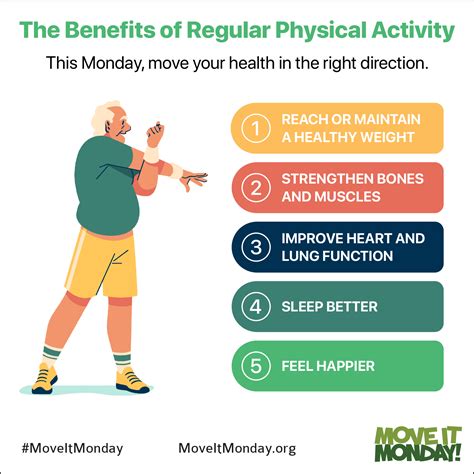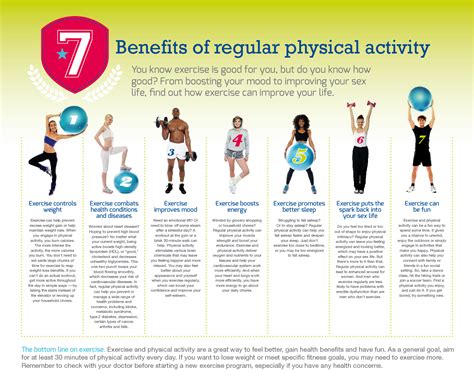Engaging in consistent physical activity has long been praised for its far-reaching advantages, encompassing both the body and the mind. Regular movement not only contributes to a robust physique but also fosters a sound mental state, fortifying the pillars of overall well-being. A steady commitment to physical exercise cultivates a plethora of positive effects that go beyond mere physical fitness, encompassing enhanced cognition, boosted mood, and improved quality of life.
Undeniably, incorporating exercise into our daily lives is an efficient strategy to maximize physical function and vitality. By diligently participating in varied physical activities ranging from brisk walking to strength training, individuals nurture their physical form, bolstering their strength, endurance, and flexibility. Additionally, this consistent effort fortifies the cardiovascular system, reducing the risk of heart disease, hypertension, and other related ailments. Regular exercise stimulates the release of endorphins, neurotransmitters that generate feelings of happiness and contentment, ensuring a brighter outlook on life.
Furthermore, one often underestimates the profound effects of physical activity on mental prowess. Exercise, in all its forms, acts as a catalyst for cognitive enhancement. Vigorous and regular workouts have been found to increase brain-derived neurotrophic factor (BDNF), a protein crucial for the growth and survival of brain cells, thereby promoting cognitive plasticity and neurogenesis. This translates to sharper memory, enhanced focus, and heightened creativity, ultimately leading to a sharper mental acuity.
In addition to the immediate benefits, a lifetime commitment to regular exercise ensures a higher quality of life throughout the years. By reducing the risk of chronic conditions such as obesity, diabetes, and osteoporosis, individuals are able to age gracefully, maintaining their independence and vitality well into their golden years. Moreover, exercise fosters a sense of empowerment and self-confidence, as individuals witness firsthand the positive transformations their bodies undergo. This, in turn, generates a virtuous cycle, fueling the motivation to persist in their physical endeavors, further amplifying the benefits garnered from maintaining an active lifestyle.
The Physical Benefits of Regular Physical Activity

Engaging in consistent physical activity on a regular basis can have profound effects on one's physical well-being. It offers a multitude of advantages that contribute to the overall improvement of the body's condition and functioning.
Regular exercise promotes strength, endurance, and flexibility, thereby enhancing the body's physiological capabilities. It stimulates the cardiovascular system, increasing heart rate and blood circulation, promoting efficient transportation of oxygen and nutrients to various organs and tissues.
Furthermore, engaging in physical activity improves muscle tone and bone density, reducing the risk of developing conditions such as osteoporosis. It also aids in maintaining a healthy weight by burning calories and reducing body fat, positively impacting body composition.
Regular exercise also plays a crucial role in boosting the immune system, reducing the risk of contracting illnesses and promoting a speedy recovery from ailments. It enhances respiratory function, improving lung capacity and enhancing oxygen uptake, thereby supporting overall respiratory health.
In addition to the physical benefits, regular physical activity can have a positive impact on mental well-being, promoting greater self-confidence, reducing stress levels, and improving overall mood and mental clarity. It has been linked to the release of endorphins, often referred to as "feel-good" hormones, which contribute to a sense of relaxation and well-being.
Overall, incorporating regular physical activity into one's lifestyle is essential for improving physical fitness and overall health. The numerous advantages it offers, ranging from improved cardiovascular health to enhanced immune function and mental well-being, make exercise a key component in maintaining optimal physical and psychological well-being.
Enhanced cardiovascular health and weight management
Optimizing the well-being of the heart and achieving and maintaining a healthy weight are two key areas that can be significantly improved through regular physical activity. By engaging in regular exercise, individuals can experience marked enhancements in their cardiovascular health and effectively manage their weight.
Engaging in activities such as cycling, running, swimming, or brisk walking stimulates the cardiovascular system, leading to a strengthened heart muscle and improved blood circulation. This increased blood flow enhances the delivery of oxygen and nutrients to the body's tissues, promoting overall cardiovascular health.
Furthermore, regular exercise plays a crucial role in weight management. Physical activity helps to burn calories, which can contribute to weight loss or maintenance. By engaging in moderate to vigorous exercise, individuals can increase their metabolism, leading to greater energy expenditure even at rest. Additionally, regular exercise can help preserve lean muscle mass while reducing body fat, leading to a healthier and more balanced body composition.
Moreover, exercise has been shown to positively impact various aspects related to weight management, such as appetite regulation, hormonal balance, and psychological well-being. Regular physical activity can help control appetite by reducing feelings of hunger and promoting satiety, making it easier to maintain a healthy eating pattern. Exercise also influences the production and release of hormones involved in metabolism, such as insulin and leptin, contributing to better weight management outcomes. Furthermore, engaging in regular exercise releases endorphins, commonly known as "feel-good" hormones, which can alleviate stress and improve mood, ultimately supporting overall mental well-being.
In conclusion, engaging in regular exercise provides numerous benefits, including enhanced cardiovascular health and improved weight management. By incorporating physical activity into our daily routines, we can strengthen our hearts, improve blood circulation, and effectively manage our weight, all while promoting an optimal state of physical and mental well-being.
The Psychological Advantages of Regular Physical Activity

Engaging in consistent physical activity can have a profound impact on our mental well-being, enhancing various aspects of our psychological health. By participating in regular exercise, individuals can experience a range of positive effects on their mental state, including improvements in mood, reduction in stress levels, and enhancement of cognitive function and overall psychological well-being.
Exercise has the potential to uplift one's emotional state due to its ability to release endorphins, commonly referred to as "feel-good" hormones. These neurochemicals act as natural mood enhancers, promoting feelings of happiness and overall contentment. Furthermore, regular physical activity can assist in alleviating symptoms of anxiety and depression, making it an effective and accessible method for managing these conditions.
Physical exercise also serves as an effective stress-reliever, offering individuals the opportunity to release built-up tension and frustration. Engaging in aerobic activities, such as jogging or cycling, can help regulate the body's stress response system, allowing for a more balanced and measured reaction to demanding situations. Additionally, exercise provides a welcome distraction, shifting our focus away from the sources of stress and providing a sense of achievement and control over our bodies and lives.
Besides its impact on mood and stress levels, regular exercise has been shown to enhance cognitive function and mental acuity. Physical activity stimulates blood flow to the brain, promoting the growth of new blood vessels and increasing the delivery of oxygen and nutrients. This improved circulation can boost cognitive processes, including memory, attention, and problem-solving skills. Moreover, exercise has been linked to the production of brain-derived neurotrophic factor (BDNF), a protein that supports the growth and maintenance of brain cells, protecting against age-related decline.
Incorporating regular physical activity into one's routine not only benefits physical well-being but also plays a crucial role in promoting mental health and psychological resilience. By recognizing and harnessing the mental advantages that exercise offers, individuals can improve their overall quality of life and well-being in a holistic manner.
Reduced stress levels and improved cognitive function
Living in today's fast-paced and demanding world can often lead to overwhelming stress and a decline in cognitive function. However, incorporating regular physical activity into our daily lives can have a transformative impact on both our stress levels and cognitive abilities.
Maintaining an active lifestyle can significantly reduce the levels of stress we experience on a daily basis. Engaging in physical exercise releases endorphins, often referred to as the "feel-good" hormones, which can effectively combat stress and improve our overall mood. Whether it's going for a run, participating in a yoga class, or even taking a brisk walk outdoors, any form of exercise has the potential to alleviate stress and promote emotional well-being.
Moreover, regular exercise has been proven to enhance cognitive function. When we engage in physical activity, our brain receives increased blood flow, oxygen, and nutrients, all of which are essential for optimal cognitive performance. Exercise has been linked to improvements in attention, memory, and problem-solving skills. It also helps to promote neuroplasticity, which is the brain's ability to adapt and form new neural connections, ultimately leading to sharper cognitive abilities.
- Exercise boosts the production of neurotransmitters, such as dopamine and serotonin, which are crucial for regulating mood and promoting mental well-being.
- Physical activity stimulates the growth of new brain cells, particularly in the hippocampus, a region associated with learning and memory.
- Regular exercise enhances sleep quality, contributing to enhanced cognitive processing and overall mental clarity.
- Engaging in physical activity can help reduce anxiety and improve our ability to handle stressful situations, leading to a more focused and resilient mindset.
In conclusion, incorporating regular exercise into our daily routines can have profound effects on our stress levels and cognitive function. By reducing stress and enhancing cognitive abilities, physical activity provides a valuable foundation for achieving optimal physical and mental well-being.
FAQ
What are the physical benefits of regular exercise?
Regular exercise has numerous physical benefits. It helps to maintain a healthy weight, improve cardiovascular health, strengthen muscles and bones, increase stamina and flexibility, and reduce the risk of chronic diseases such as obesity, diabetes, and heart disease.
How does regular exercise contribute to mental well-being?
Regular exercise plays a crucial role in promoting mental well-being. It stimulates the release of endorphins, which are natural mood boosters. Exercise also reduces stress, anxiety, and symptoms of depression. It improves cognitive function, enhances self-esteem and body image, and helps in better sleep patterns.
What types of exercises can be incorporated in a regular exercise routine?
There are various types of exercises that can be incorporated into a regular exercise routine. These include aerobic exercises such as walking, running, swimming, or cycling, strength training exercises using weights or resistance bands, flexibility exercises like yoga or stretching, and balance exercises. It is important to choose activities that one enjoys and can sustain over time.



